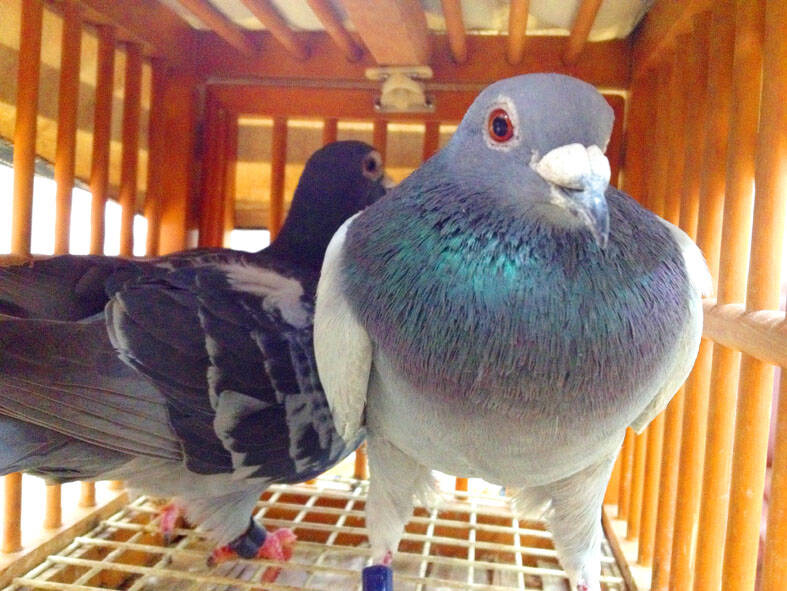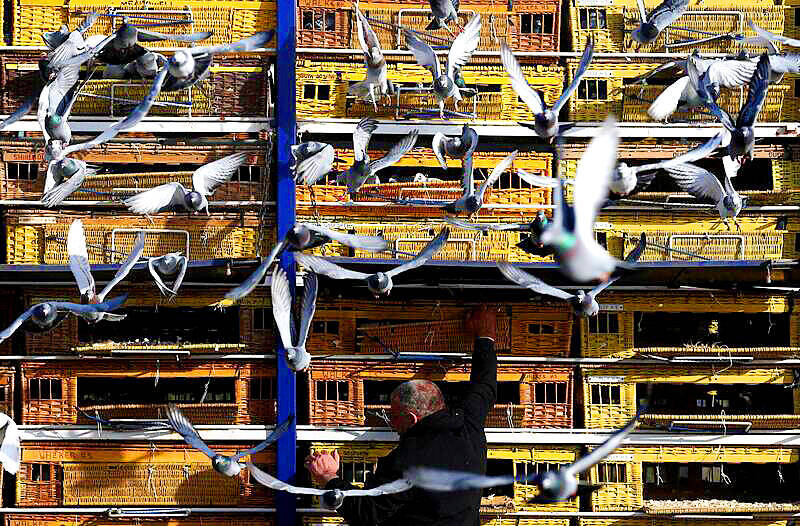There is almost nothing some handlers will not do to win. Competitors have been kidnapped and then offered up for ransom. Others have reportedly been smuggled onto high-speed trains to get to the finish line first. Some are said to be kept hungry so that they move quicker on race day.
This is the fast and furious world of pigeon racing in Taiwan.
The sport is globally popular and centuries old, but few scenes are as bizarre as Taiwan’s, where the stakes are high and no scheme is too complex or crafty for some — but members want things to change.

Photo: Huang Liang-chieh, Taipei Times
Wu Chung-ming is chair of the national pigeon racing body and his local racing association. His desk is adorned with a kitschy pigeon-shaped ashtray, near a computer mining pigeoncoin cryptocurrency. Parked outside is the Tesla he bought specifically for its gull-winged doors.
“At first, I was not particularly into it, but once I started getting involved, I met all these really passionate people who were crazy about the sport,” he said.
Wu is among members calling for regulation to address the shady sides of the sport and make it easier for rule-abiding competitors to compete cleanly and safely.

Photo: Reuters
Taiwanese pigeon racing originated during Japanese colonial rule a century ago, later evolving into a pastime among working-class people from outside the cities.
It is now one of the world’s largest with about 200,000 breeder-trainers and countless investors, across about 80 regional clubs racing up to 1 million birds a year.
While the demographics mostly stayed the same, it has grown into a multimillion-dollar competitive industry, with official prize pools that can exceed NT$30 million (US$980,232) a season, but it sits in a legal gray area.
“If it is illegal, then please shut us all down as soon as possible,” Wu said. “But if it is legal, then shouldn’t there be some policies in place to support us?”
The chaotic combination of low regulation and lots of cash has led to extraordinary behavior, including the high-speed rail stunt and what Wu said is a common scheme — cloning tracking chips to send a secret second bird over the finish line early.
Some trainers will even put a pigeon’s mate in a separate cage with another bird hoping the jealousy will fire up the racer’s wings. Some trainers put a pigeon’s mate in a separate cage with another bird hoping the jealousy would fire up the racer’s wings.
“Running a pigeon club in Taiwan is honestly tough, because there is so much cheating,” Wu said. “There were all kinds of tricks — I have heard a lot of them.”
Wu said he is willing to work with welfare groups and the government to create “a healthier form of the sport,” brought out of the gray area, but the government has left them “stuck in limbo.”
The government claims pigeon racing is linked to too much crime.
As well as the cheating and kidnapping, there are also alleged ties in some cases to criminal gangs, accusations of animal cruelty and reports of billions of New Taiwan dollars in potentially illegal side-betting that total far more than the official prize pools.
In other counties, Taiwanese police raid what they say are illegal betting rings operating out of local associations. Officials have been arrested or jailed and hundreds of millions of dollars seized.
“Gambling offenses have long been a key enforcement target,” the Ministry of the Interior said, while the Ministry of Agriculture said illegal gambling was the industry’s “main source of revenue.”
Wu said his association does nothing illegal, adding that unofficial prize pools are not illegal.
“What we do in pigeon racing is not gambling, it is a competition prize. The government has never really given us a clear stance on it,” he said.
The industry has tried to address the cheating.
In the late 1990s, all pigeon races were moved offshore, packing tens of thousands of birds on to container ships to fly a route almost entirely over the open ocean.
That format has been condemned by animal rights groups, which said that huge numbers of pigeons are lost at sea in races that appear to go ahead no matter the weather. Authorities say loss rates in some races are as high as 98 percent.
Rights groups said birds are often mistreated, and cruelly discarded once past their prime. Some want racing banned outright.
Taiwan Animal Protection Monitoring Network secretary-general He Tsung-hsun acknowledged that the “culture is deeply embedded in Taiwanese society,” urging authorities to start with a ban on sea races and to better investigate allegations of illegal activity.
Wu said legal racers also want changes.
“That kind of behavior [mistreatment and theft] is terrible to us, too. We want to fix that. I want to talk to these groups and say: ‘OK, if we go back to land-based races where fewer birds get lost or hurt, I am all for it,’” he said.
Pigeon racers say the loss figures misinterpret late finishers as dying or disappearing. At season’s end, Wu’s association would register about 60 percent of birds returning home.
Handlers say improving animal welfare is a key argument for further regulation of the sport.
“If races can be kept fair and clean, with no cheating and no shady characters, we would not necessarily have to rely on sea races,” said Huang Nai-shun, a pigeon breeder and racer.
Inside his rooftop pigeon loft in Chiayi County, Huang tended his pigeons with affection.
He said the racing season takes every spare dollar as well as months of early mornings and late nights for training flights.
“It’s tough,” he said . “It’s all down to what you love — people only do this if they truly enjoy it.”
Handlers have pushed back on the criticism of their sport. For them, it is not about the prize money, which they said they rarely see themselves, it is about the thrill of the race and the payoff for hard work.
“It feels like training your own Olympic athletes,” said 29-year-old Lin Yo-chen, one of the few people younger than 40, registering his last three competing birds.
He loves “everything” about the sport, he said, adding that the other 27 birds he raced this season are all safely back at home.
Octogenarian Chen Bi-chou has been racing pigeons for seven decades.
He is optimistic about his last remaining racer, but said he loves the sport for the community, and the tactical thinking that he believes helps keep dementia at bay.
“You have put so much care into training them, and when you release them far away — sometimes in rough weather — and they still find their way home, it is moving,” said Tu, a 61-year-old retired prison guard.
Legitimizing the sport would require new legislation, the creation of a “competent authority,” strong industry self-regulation and an end to illegal gambling, the agriculture ministry said.

Taiwanese can file complaints with the Tourism Administration to report travel agencies if their activities caused termination of a person’s citizenship, Mainland Affairs Council Minister Chiu Chui-cheng (邱垂正) said yesterday, after a podcaster highlighted a case in which a person’s citizenship was canceled for receiving a single-use Chinese passport to enter Russia. The council is aware of incidents in which people who signed up through Chinese travel agencies for tours of Russia were told they could obtain Russian visas and fast-track border clearance, Chiu told reporters on the sidelines of an event in Taipei. However, the travel agencies actually applied

Japanese footwear brand Onitsuka Tiger today issued a public apology and said it has suspended an employee amid allegations that the staff member discriminated against a Vietnamese customer at its Taipei 101 store. Posting on the social media platform Threads yesterday, a user said that an employee at the store said that “those shoes are very expensive” when her friend, who is a migrant worker from Vietnam, asked for assistance. The employee then ignored her until she asked again, to which she replied: "We don't have a size 37." The post had amassed nearly 26,000 likes and 916 comments as of this

New measures aimed at making Taiwan more attractive to foreign professionals came into effect this month, the National Development Council said yesterday. Among the changes, international students at Taiwanese universities would be able to work in Taiwan without a work permit in the two years after they graduate, explainer materials provided by the council said. In addition, foreign nationals who graduated from one of the world’s top 200 universities within the past five years can also apply for a two-year open work permit. Previously, those graduates would have needed to apply for a work permit using point-based criteria or have a Taiwanese company

The Shilin District Prosecutors’ Office yesterday indicted two Taiwanese and issued a wanted notice for Pete Liu (劉作虎), founder of Shenzhen-based smartphone manufacturer OnePlus Technology Co (萬普拉斯科技), for allegedly contravening the Act Governing Relations Between the People of the Taiwan Area and the Mainland Area (臺灣地區與大陸地區人民關係條例) by poaching 70 engineers in Taiwan. Liu allegedly traveled to Taiwan at the end of 2014 and met with a Taiwanese man surnamed Lin (林) to discuss establishing a mobile software research and development (R&D) team in Taiwan, prosecutors said. Without approval from the government, Lin, following Liu’s instructions, recruited more than 70 software